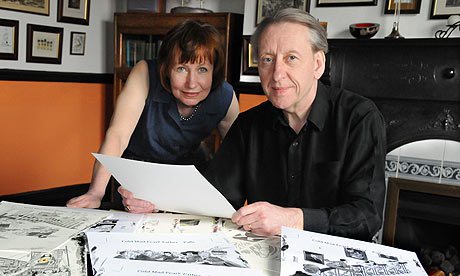Bryan Talbot, author and writer of Grandville, The Adventures of Luther Arkwright and Alice in Sunderland among many more was kind enough to talk to me about his career and influences, and the future of the comic book industry.
– When did your interest in fantasy begin, and what draws you to it?
When I was 6 I saw the first TV showing of “Quatermass and the Pit” and my mum took me to the cinema to see Ray Harryhausen’s “The 7th Voyage of Sinbad”. Both gave me nightmares – and both got me hooked! Between the ages of 12 and about 30, I pigged out on fantasy, horror and SF novels. Since then I only dip in now and again.
– Your degree is in graphic design – what did you want to do at that time? How did things change?
It was actually a college diploma. I didn’t know what I wanted to do back then. By the end of the course, I knew I didn’t want to work in advertising. After graduating, I was unemployed for a while and took the time to finish drawing an underground comic I’d started working on at college. That became the first issue of Brainstorm Comics and the start of my career as a comic writer/artist.
– You received an honourary doctorate of arts in Sunderland, the first time a comic book artist has ever received one. Do you think this helps to legitimise comic books in the art world?
I think anything like that helps. Since then, I heard that Pat Mills has been made a visiting Professor of Liverpool University and Mark Millar has also been awarded a doctorate. I was actually awarded an honorary doctorate of letters last year by Northumbria University.
– Some of your work has been political, such as The Cannabis Conspiracy and your anti-homophobic legislation comic From Homogenous to Honey with Neil Gaiman. Would you hope to change someone’s mind with these? Do you think comic books can be used as levers for social change?
My work is usually political in some way. The Adventures of Luther Arkwright has an anti-fascist theme, produced, as it was during the Thatcher government and the rise of the far right in the shape of the National Front. I did some illustrations for the Anti-Nazi League. Heart of Empire is an anti-imperialist fable. Grandville reflects the way the UK and American governments lied to their populations about Saddam Hussein’s supposed weapons of mass destruction and Grandville Mon Amour is about the human effects of terrorism and the dehumanising of the perpetrators. Grandville Bête Noire is anti-capitalist. I think it’s perfectly possible to tell an exciting adventure story and not be entirely escapist. I hope that readers are influenced by the books in some small way.
– Do you think you would, or do, still write political commentary?
No, I’m a storyteller, not an essayist.
– How do you find working closely with your wife?
Very natural and easy. Both Dotter of Her Father’s Eyes and her current book, Sally Heatcote: Suffragette, have been extremely close collaborations with ideas flowing either way.
– If you could work with any artist or writer, living or dead, who would it be?
I would have loved to have written for Moebius. Or Arthur Rackham! Imagine a comic drawn by Rackham!
– You are somewhat of a comic book legend. How do you see the future of the industry, and the future for your own work?
That’s very kind of you to say but, really, I’m relatively little-known in terms of the comic industry. I think things will progress as they have been doing, with the continued rise of the graphic novel and the slow demise of the monthly comicbook. As for my own work, I’m currently doing the page layouts and panel compositions for Sally Heathcote (with finished artwork by Kate Charlesworth, who’s doing a brilliant job),drawing Grandville Nöel and have scripted the 5th, which I hope to do immediately afterwards. That takes up the next 2 or 3 years at least.


